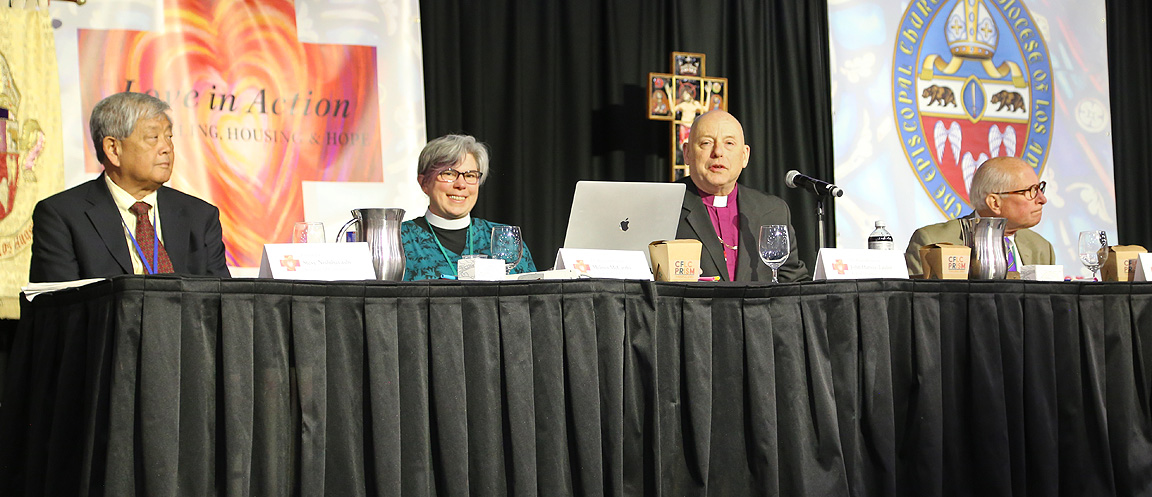
Presiding over the 2023 meeting of Diocesan Convention, Bishop John Harvey Taylor is flanked by Canon Steven Nishibayashi, secretary of convention; Canon Melissa McCarthy, canon to the ordinary; and Canon Richard Zevnik, chancellor. Photos: Janet Kawamoto
[The Episcopal News] Bishop John Harvey Taylor’s vision of love in action includes tackling climate change, developing affordable housing, securing economic justice and building beloved community via showing up to “the precious and unique miracle of other people” locally, regionally, and internationally.
Amid applause, and shouts of “yeah” and “Amen,” Taylor on Nov. 10 welcomed hundreds of online and in-person delegates, visitors, guests, and exhibitors to the Riverside Convention Center for the 128th annual meeting of the diocese, themed “Love in Action for Healing, Housing and Hope.” Guests included Robert Ross, M.D., president of the California Endowment, as the Margaret Parker lecturer (see related story) and Lucy Jones, Ph.D., founder of the Lucy Jones Center for Science and Society, who was guest preacher at the Nov. 11 Eucharist.
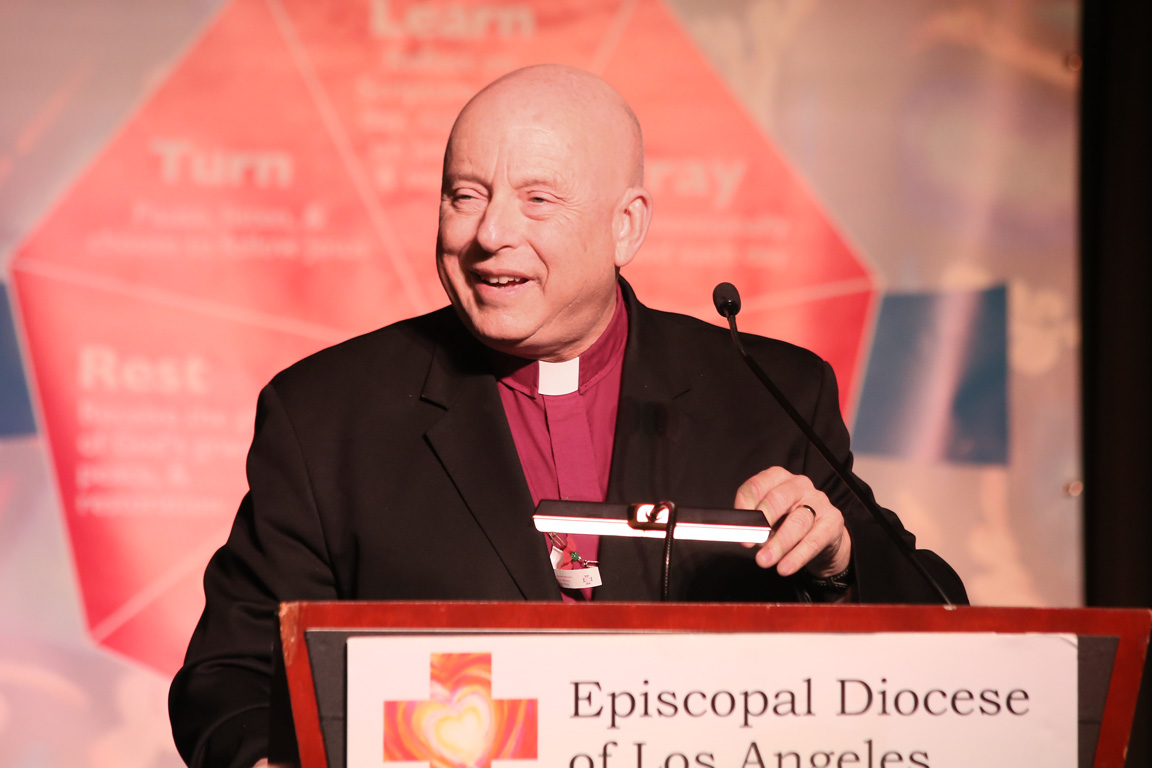
Bishop John Harvey Taylor delivers his address at Diocesan Convention on Nov. 10.
In an era plagued by what he called a “global epidemic of sleeping sickness,” Taylor recalled sharing “incarnational connection” with parishioners during his official visitations to many of the diocese’s culturally diverse congregations – and invited Episcopalians to do likewise. “I do it almost every week – jump in, the holy water’s fine!”
For example, he noted a series of 2023 worship services hosted by the Program Group on Black Ministries and the Union of Black Episcopalians, including Presiding Bishop Michael Curry preaching at the Martin Luther King celebration at Christ the Good Shepherd Church. A 2024 series is also planned, and “when we’re invited to come to church in Leimert Park, or at St. Barnabas in Pasadena, or at Church of the Advent on West Adams in Los Angeles, that invitation is to all of us, not just those who already go to church there!” (A video report on Black ministries is here.)
Similarly, other events – including the 80th anniversary of Li Tim Oi’s ordination as the Anglican Communion’s first female priest, are open to the entire diocesan community. It is “an event for all of us to enjoy, a means of learning and atoning, a way to bridge difference and make friends. Because more often than you’d think, being woke is just a matter of showing up.”
Serving in one of the most populous and culturally diverse regions of the country, the six-county Los Angeles diocese offers the possibility of touching more than 17 million souls. “In the city of Los Angeles alone, people from 140 countries speak 225 languages,” Taylor said. “Our diocese is a laboratory for an Episcopal Church that will be more likely to survive and thrive once our congregations resemble our neighborhoods.”
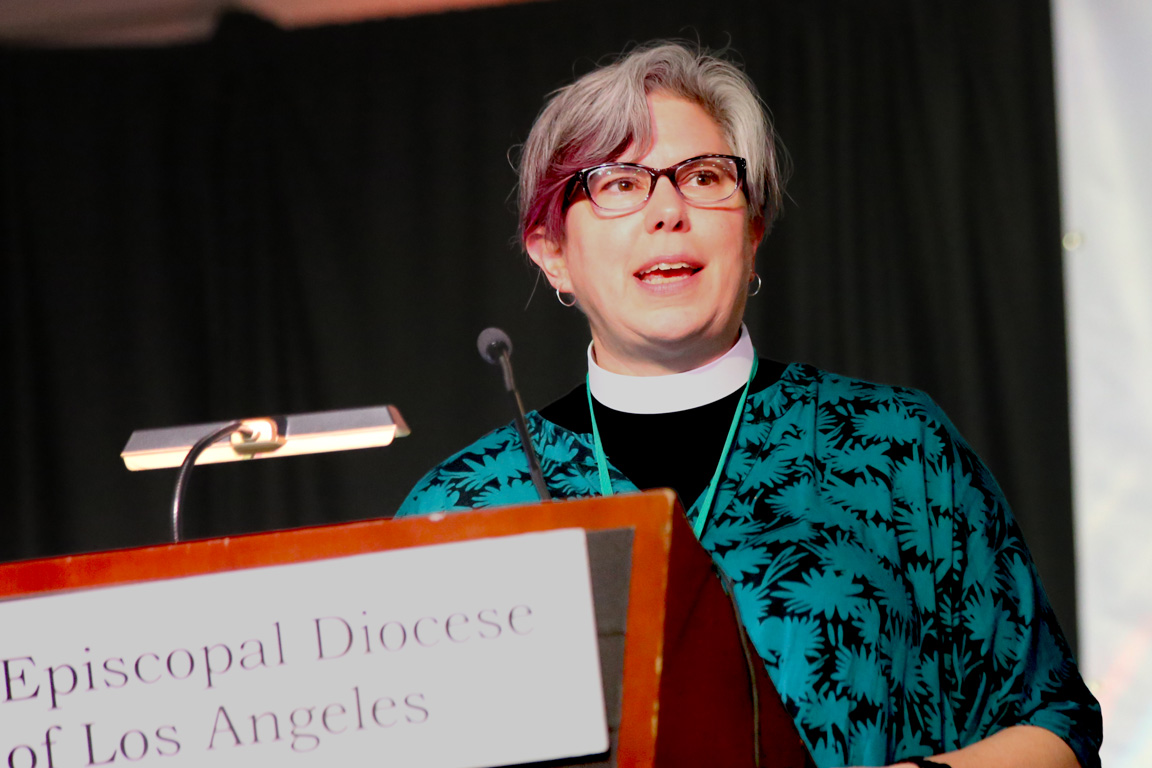
Canon to the Ordinary Melissa McCarthy addresses convention on Nov. 11.
Climate Change: ‘environmental reformation’ of the diocese
Through the efforts of the Bishop’s Commission on Climate Change, and Jones’ tutelage, the diocese has begun an “environmental reformation,” adopted in 2022 by convention, Canon to the Ordinary the Rev. Melissa McCarthy said in her Nov. 11 address to the gathering.
That resolution included plans to achieve carbon neutrality by 2030; an audit of and reduction of diocesan travel; educational offerings and representation on the commission from every congregation.
“In 2023, we held our first climate town hall, which was well attended, and way exceeded the expectations any of us had for the day,” McCarthy said.
The commission has also piloted and is ready to begin a second disaster resiliency program for congregations, led by Jones, who is the senior warden at St. James’ Church in South Pasadena.
Jones, preaching at the Nov. 11 Eucharist, reiterated dire warnings that global warming and climate change denialism could result in human extinction. “It is human-caused. If left unchecked, climate change really will destroy the world. Ecosystems around the world are already experiencing a different climate than they were evolved for. Wildlands are burning and crops are failing. If you aren’t terrified by what is happening, you aren’t looking at it enough and you are almost certainly underestimating the speed at which these changes are happening.”
She added that in the lifetime of her grandchildren, “significant parts of the world will be too hot to sustain agriculture. Maybe a billion people or even more will be forced to choose between moving and dying. Mass migration on that scale could easily lead to world war. If we do not change our ways, we invite the end of human society,” Jones said.
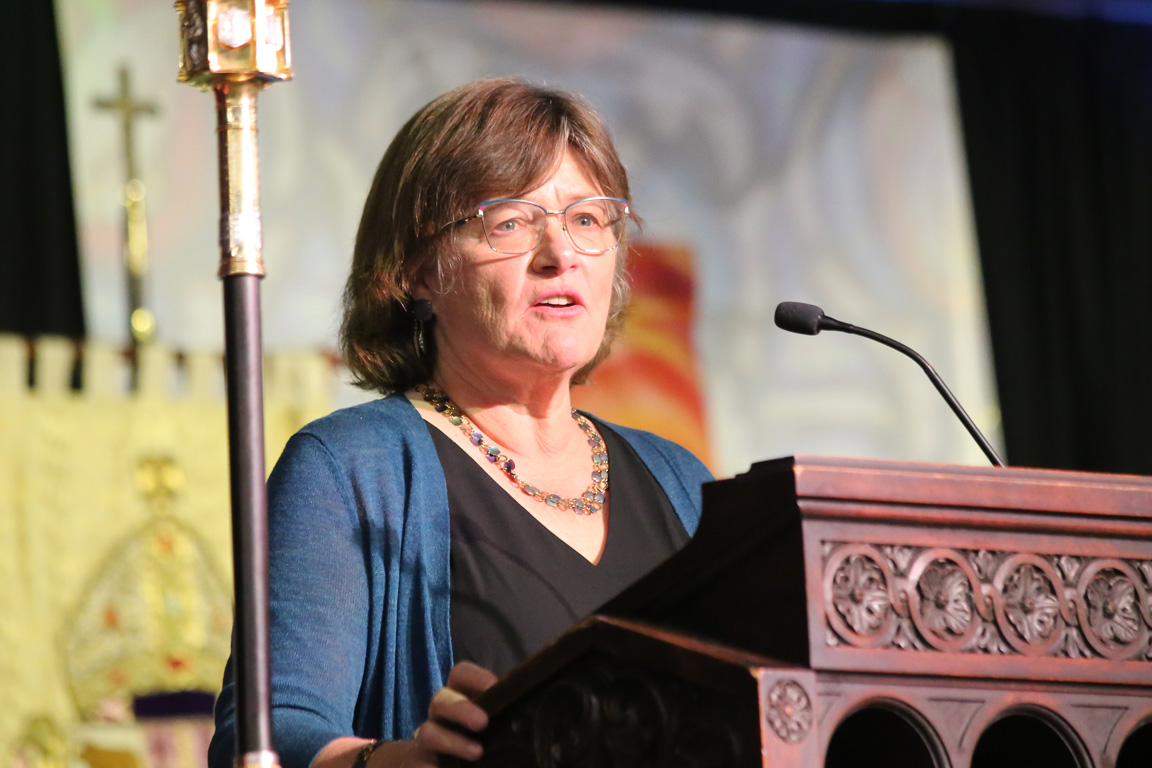
Lucy Jones, renowned climate scientist and member of St. James’ Church, South Pasadena, preaches at the convention Eucharist on Nov. 11.
However, the power grid is undergoing transformation, and a lot is within our ability to change. “Talk about climate change,” she said. “Make your next appliance an electric one. Get solar for your church. Prepare for disasters and find ways to help each other. Love each other. Love our world as an integral part of our community. Be in community.
“Churches are where we are in community, where we can get the spiritual support system to face down our fears and give us the courage to care.”
Extreme heat creates a climate gap, most adversely affecting people of color and the poor, McCarthy told the gathering.
“We are a predominantly white crowd here today,” she said. “Many of us don’t understand what whiteness means in our world, how it affects our neighbors and our friends.” Such understanding is part of the baptismal covenant, which involves becoming educated about how cultural differences contribute to environmental racism.
“We cannot stand in church on Sunday and say we will strive for justice and peace among all people and respect the dignity of every human begin and then choose not to understand how the way we live harms others.”
Building Beloved Community
Building beloved community involves recommitting to nurturing interfaith relationships and deepening understandings of the Holy Land and its people. So is advocating “for peace, justice, freedom, and national self-determination for all,” said Taylor, who condemned as “unjustifiable terrorism” the Oct. 7 Hamas attack on Israeli citizens.
Yet, as the death toll in Gaza climbs and with no release of hostages, he added: “We demand that all in authority on all sides put the safety and care of noncombatants first. We contend that the region won’t know peace until Israel’s illegal occupation of the West Bank comes to an end and an independent Palestine takes its place in the family of nations, with rich nations doing all they can to help.”
Taylor invited generous contributions to a United Thank Offering challenge grant to help sustain outreach ministries in the Episcopal Diocese of Jerusalem, which operates across several countries or territories and includes churches, schools, medical facilities, and other ministries. According to the UTO website the organization, which since 1889 has supported innovative mission projects, will match donations given through Dec. 15, up $100,000. (More information is here.)
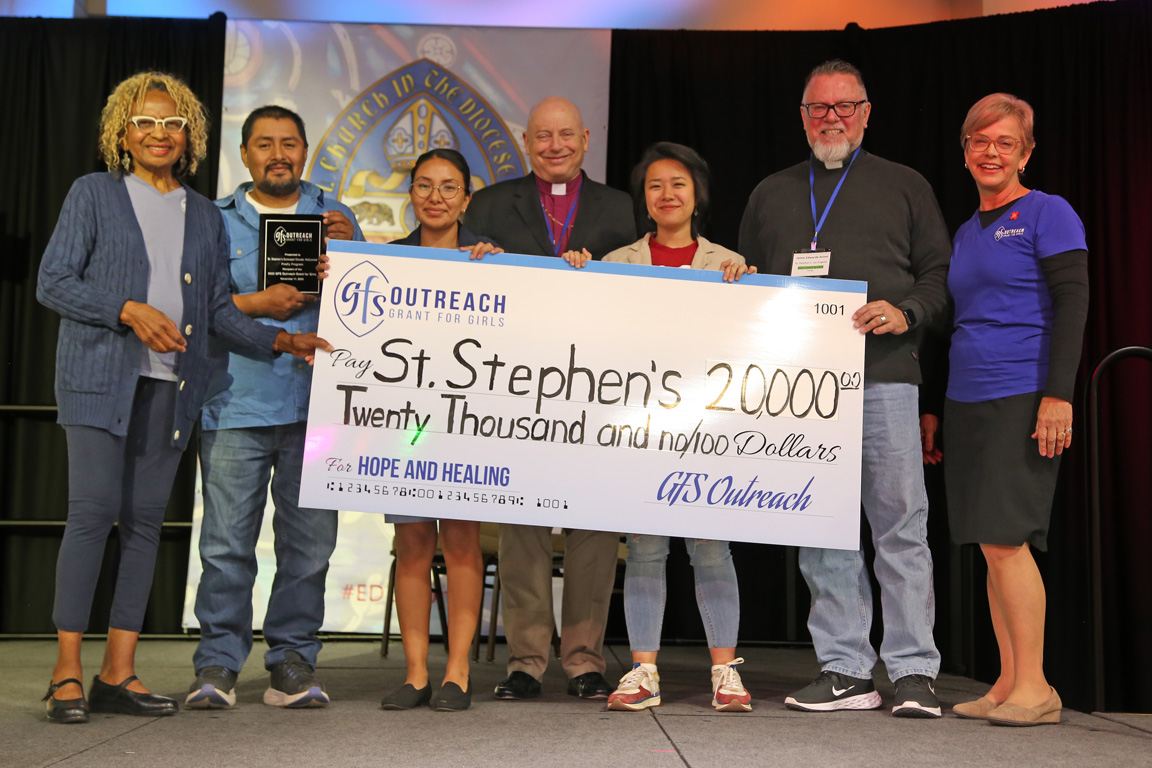
Girls Friendly Society-Los Angeles leaders Martha Watson (left) and Margaret Nolde (right) present a ceremonial grant check to the Firefly electrical training program for girls at St. Stephen’s Church, Hollywood.
More locally, Margaret Nolde, president, and Martha Watson, grant chairperson of the diocesan Girls Friendly Society (GFS), announced the award of a $20,000 grant over a two-year period to St. Stephen’s Church in Hollywood, in support of its Firefly program, which offers technical electrical training, hands-on projects, and mentorship in a fun and interactive space for girls ages 13 to 17.
Emily Sanchez, a Firefly participant, said in a video report on the grant project that she joined the program “because of the independence it will give me later in life when I have my own apartment or house. The skills are very useful, you can make some friends, and one really important thing about the GFS outreach is that it brings people together from across the community, maybe people you wouldn’t have met otherwise.”
The Rev. Canon Jaime Edwards-Acton, St. Stephen’s rector, said the program was inspired by a parishioner, Alberto Lucas, originally from Mexico, who came to the United States in search of work and eventually became an electrician.
“Over the years he has expressed to me his desire to teach young people in the church about the electrical trade and really wanting to give back in ministry in that kind of way,” Edwards-Acton said in the video. Valeria Lucas, Alberto Lucas’ eldest daughter and a teacher at the church’s Delaney Wright Fine Arts Preschool, is the program mentor.
For information about the program, which has openings, contact St. Stephen’s Church.
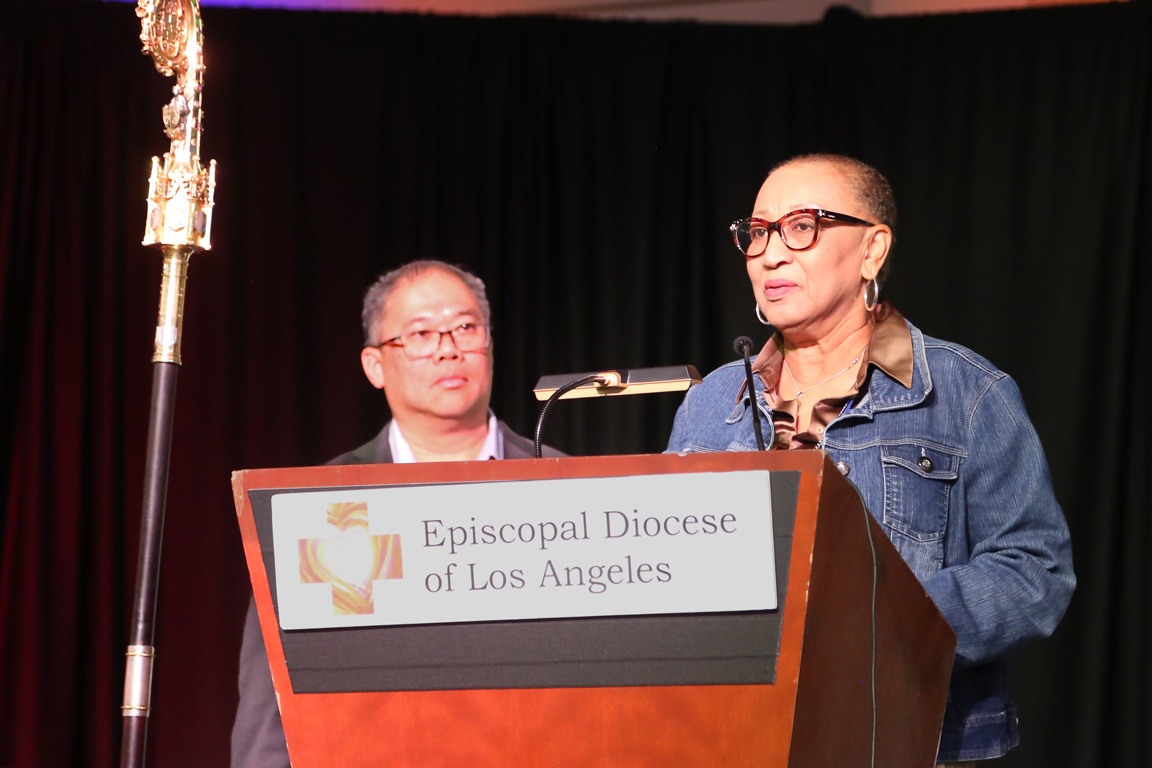
Canon Urla Gomes outlines the history of the Episcopal Community Federal Credit Union, which she served for many years as CEO – and introduces Johnny Lee, her successor.
Economic Justice
Retiring credit union CEO Urla Gomes, named an honorary canon Nov. 10 by Taylor, recalled the creation of the Episcopal Community Federal Credit Union in the wake of the 1994 Los Angeles riots, as a vehicle for economic justice, with an initial grant of $300,000 from The Episcopal Church.
Today, the 49-year-old entity has assets of $6.4 million, she said, amid applause. The credit union offers low-interest, smaller loans and offers alternatives to predatory moneylenders as well as to mainstream banks that reject less-resourced borrowers, she said. Churches may also benefit from loans, to refurbish halls, upgrade plumbing, heating and air conditioning systems. Also, she said, the credit union needs additional members and deposits. (More about ECFCU is here.)
Gomes also introduced John E. Lee, who succeeds her as CEO.
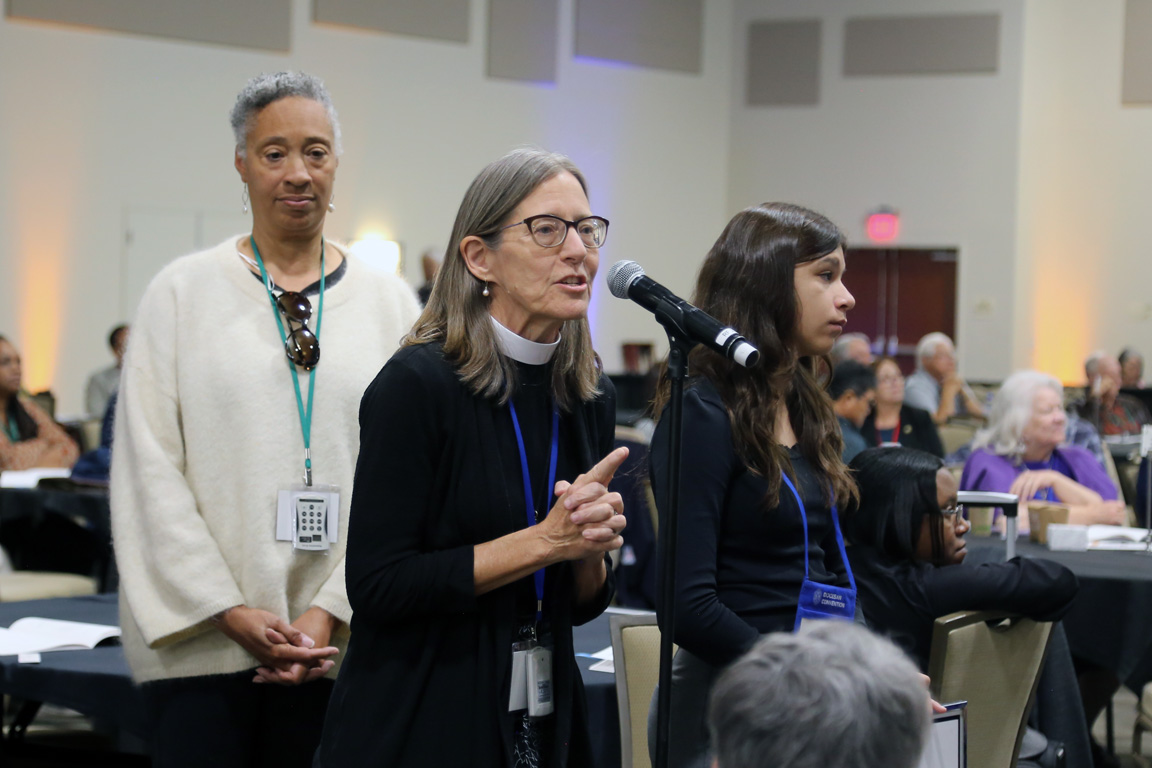
Jane Gould, pictured here speaking to a resolution, also reported on the work of the Program Group on Compensation and Benefits.
The Rev. Jane Gould, recently retired rector of St. Luke’s, Long Beach, said the Program Group on Compensation and Benefits, created by the 2022 diocesan convention, is working on a survey of clergy and laity to learn more about their pay and benefits. The group has updated clergy compensation minimum salary rates and affirmed parity between lay and ordained employees as a priority. Those responding to the survey said the $70,000 minimum annual clergy compensation didn’t adjust for inflation, which would amount to slightly over $80,000, and expressed concern that parishes and missions might no longer be able to employ full-time clergy at those compensation and benefits standards, especially with a mandatory 12% mission share fund contribution, she said.
Convention-goers also viewed a video outlining recent progress of Taylor’s initiative to devote 25% of diocesan land to develop affordable housing, possibly sheltering as many 5,000 members of the community.
St. Michael’s Apartments in Riverside, for example, offers 50 one- and two-bedroom apartments along with much-needed social services. “Most of our residents are on limited incomes,” according to the Rev. Canon Mary Crist of St. Michael’s Ministry Center. “They will pay up to about 30% of their income in rent. Many people think this is free housing or temporary shelter, but it is permanent supportive housing with case management.”
Two other projects, at St. Joseph’s Church in Buena Park, and the Church of the Blessed Sacrament in Placentia, are under construction. “At least 10 others are on the drawing board, and there are 20 more coming behind that,” Taylor said.
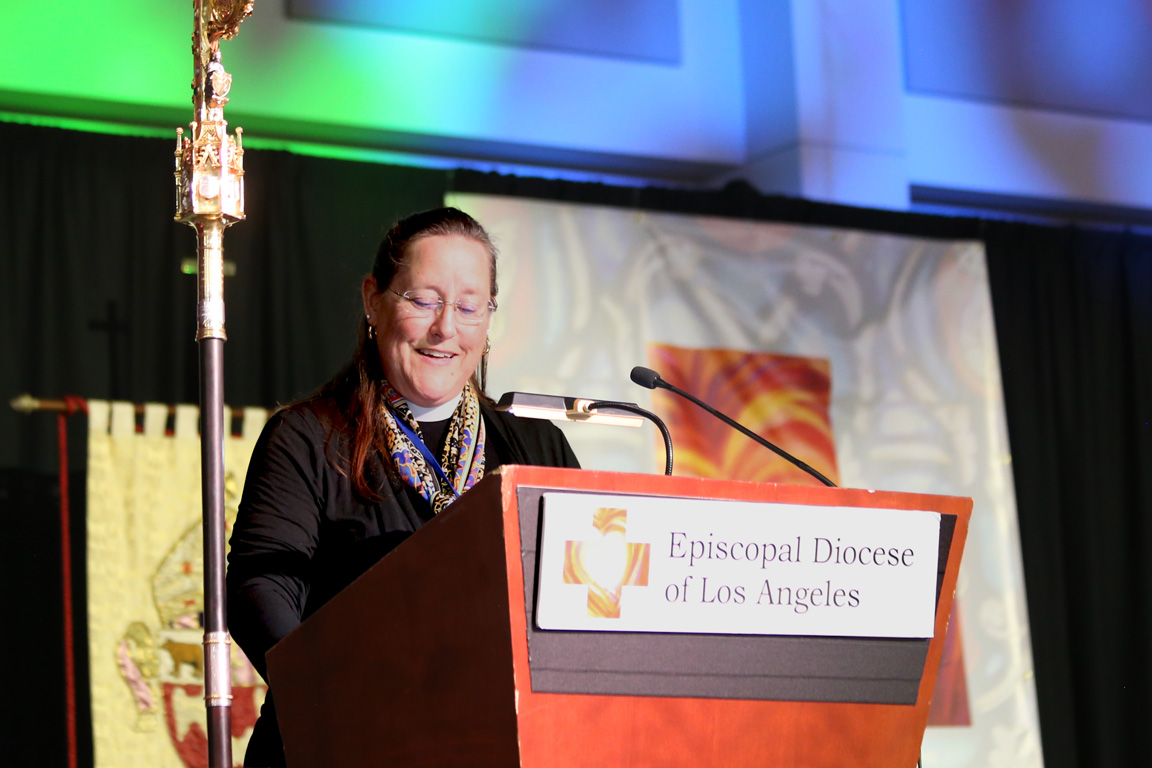
Rachel Nyback, rector of St. Cross Church, Hermosa Beach, explains the work of the 12% Assessment Review Committee.
12% Assessment Review Committee Report: ‘We are in this together’
The Rev. Rachel Nyback, chair of the 12% Assessment Review Committee, told convention Nov. 11 the assessment to be instituted in 2024 helps to fund diocesan ministries and “is not a pledge,” but “part of who we are as The Episcopal Church. We are in this together.”
Currently, 29 of 61 diocesan parishes contribute to the MSF at the 12% level. Mission congregations are assessed at 10% of their pledge and plate income, plus another 5% in additional assessments, she said.
However, there are churches “we believe can give at 12% but have not prioritized the MSF in their budget,” she told convention. “We understand it is a challenge, a shift in theology of money … and that making the shift is not easy. For those not at 12% it takes education, difficult discussions, prayer, listening and care.
For parishes that absolutely cannot pay, an application process is available on the diocesan website to seek a one-year reprieve, she said. “It will ask for budgets, about your stewardship programs, and for a letter of understanding from the vestry, so the vestry is clear they know 12% is the diocesan expectation.”
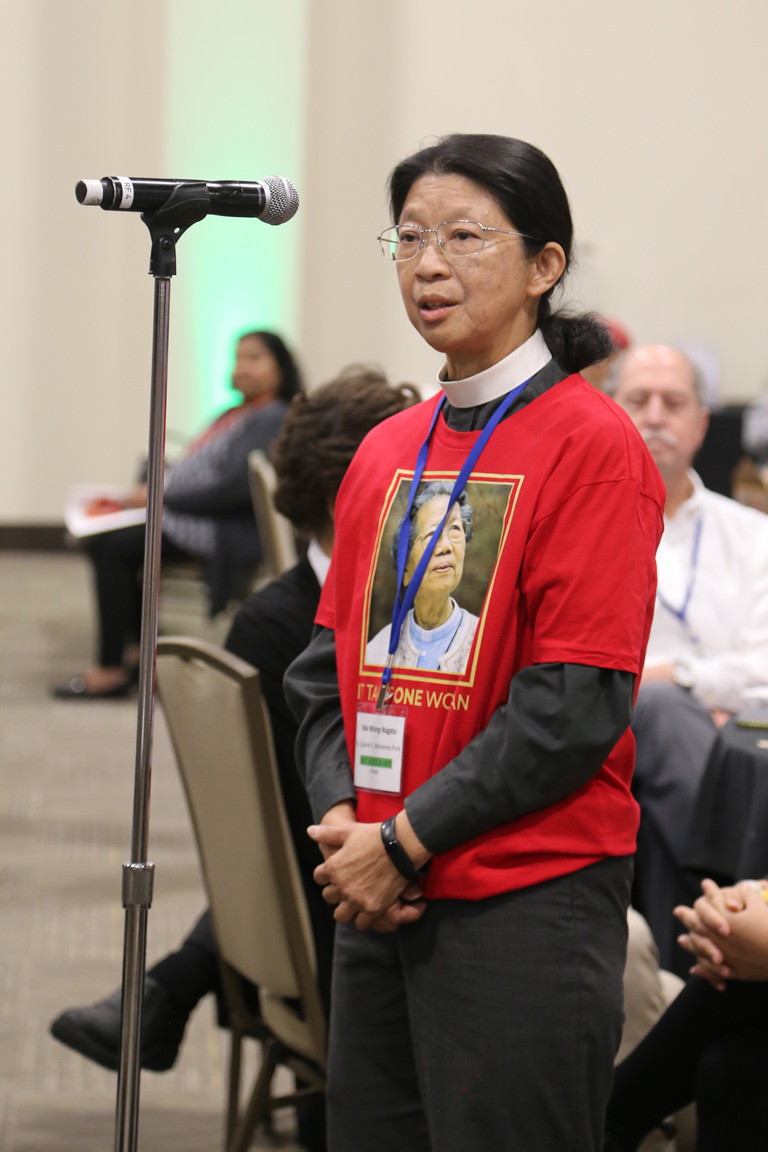
Ada Nagata speaks in favor of a resolution honoring Li Tim-Oi, first woman priest in the Anglican Communion.
The ARC reviews and recommends whether to accept or reject the applications to Diocesan Council which, in turn decides the outcome. If a request is denied, and the church still fails to contribute at the 12% level, they may be denied voice and vote and the following year’s convention, she said.
In other convention action, lay and clergy delegates elected diocesan officers (election results are here), approved an $11 million balanced consolidated budget, with a $5.8 million MSF portion including $4.9 million coming from assessments.
Delegates overwhelmingly passed resolutions approving a companion relationship with the Episcopal Diocese of Taiwan; designating the first Sunday of Advent as Holy Family Sunday; adopting the General Convention’s Resolution D079 commemorating the 80th anniversary of the ordination of Li Tim Oi, and holding a celebration Feb. 10-11, 2024 at Church of Our Saviour, San Gabriel, which hosts a center named in her honor. A January 6, 2024, fundraiser dinner will promote and support the event.
Convention also adopted a resolution recommending commemoration of the Philadelphia Eleven in The Episcopal Church calendar; a celebration of the first 11 women ordained to the priesthood in The Episcopal Church. That service took place on July 29, 1974 at the Church of the Advocate in Philadelphia; two years later, General Convention approved the ordination of women.
Videos of convention may be found at the following links:
- First day’s business sessions
- Second day’s business sessions
- Sermon by Dr. Lucy Jones at the Convention Eucharist
- Bishop John Harvey Taylor’s address
- Canon to the Ordinary Melissa McCarthy’s address
- Margaret Parker Lecture by Dr. Robert Ross
- Black Ministries
- LGBTQ+ Ministries
- Affordable Housing Initiative
- GFS Outreach grants program
- Necrology
